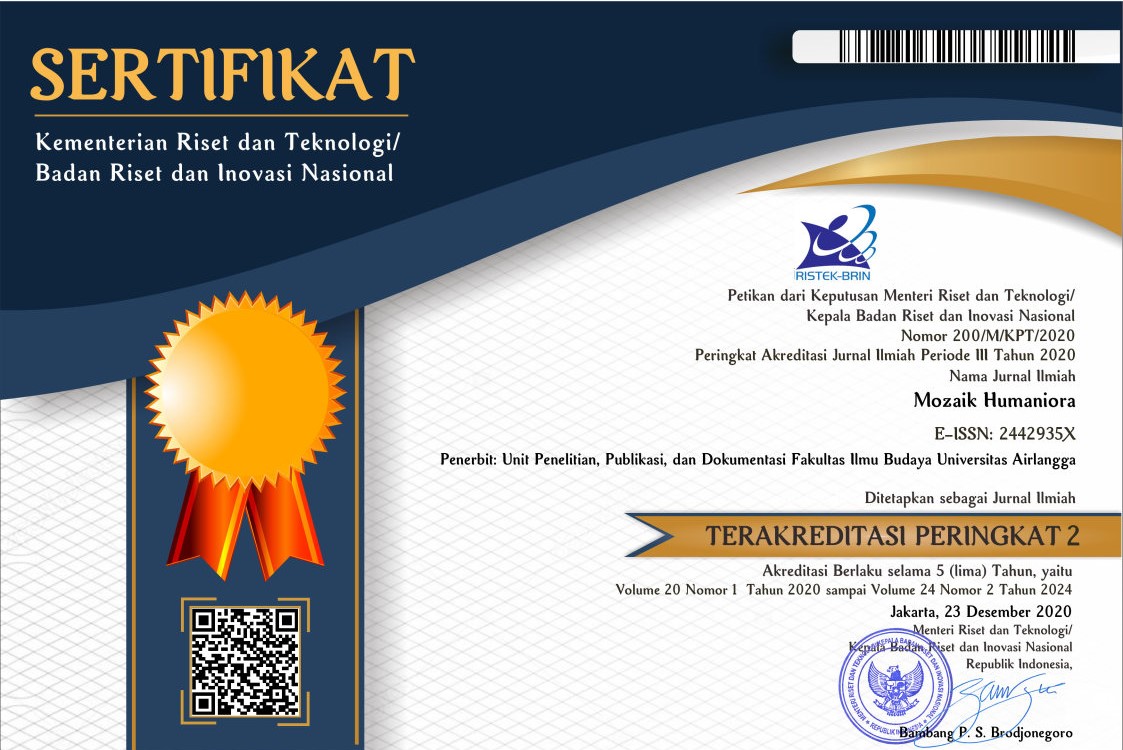Refleksi Kehidupan Mikhail Bulgakov di Apartemen Komunal Soviet dalam Novela Manusia Berjiwa Anjing dan Telur Fatal
Downloads
Penelitian ini bertujuan untuk mengeksplorasi pandangan dunia Mikhail Bulgakov tentang apartemen komunal. Mikhail Bulgakov melalui kedua novelanya yang berjudul Собачье Сердце (Manusia Berjiwa Anjing) dan Роковые Яйца (Telur Fatal) mengkritisi kebijakan perumahan yang dilakukan oleh pemerintah Soviet. Ia sering menampilkan kekurangan yang ada di apartemen komunal di dalam kedua novela tersebut. Permasalahan dalam penelitian ini adalah bagaimana penggambaran tentang apartemen komunal yang ada di dalam novela lahir dari pandangan dunia
Bulgakov dan bagaimana Bulgakov menggambarkan apartemen komunal dalam novela yang dibuatnya. Penelitian ini bersifat kualitatif deskriptif. Teori strukturalisme genetik Lucien Goldmann digunakan untuk menganalisis pandangan dunia Bulgakov. Hasil penelitian menunjukkan bahwa pandangan dunia Bulgakov memengaruhi penggambarannya tentang apartemen komunal yang ada di dalam kedua novela. Apartemen komunal digambarkan oleh Bulgakov sebagai tempat tinggal yang tidak nyaman, banyak aturan, dan tidak aman.
Becker, C., S. J. Mendelsohn, dan K. Benderskaya, K. 2012. Russian Urbanization in the Soviet and Post-Soviet Eras. London: International Institute for Environment and Development.
Bulgakov, M. A. 2011a. Роковые Ñйца. МоÑква: ÐкÑмо.
________. 2011b. Собачье Ñердце. МоÑква: ÐкÑмо.
Chudakova, M. 2019. Mikhail Bulgakov: The Life and Times. London: Glagoslav Publications.
Cockrell, R. 2013. Mikhail Bulgakov: Diaries and Selected Letters. London: Alma Classics.
Curtis, J. (ed.). 2012. Manuscripts Don't Burn. New York: Overlook Press.
Damono, S. D. 1978. Sosiologi Sastra: Sebuah Pengantar Ringkas. Jakarta: Departemen Pendidikan dan Kebudayaan.
Faruk. 2019. Pengantar Sosiologi Sastra dari Strukturalisme Genetik sampai Post- Modernisme. Yogyakarta: Pustaka Pelajar.
Goldmann, L. 1980. Essays on Method in the Sociology of Literature, disunting oleh W. Q. Boelhower dan diterjemahkan oleh W. Q. Boelhower. Missouri: Telos Press Ltd.
Haber, E. C. 1992. "The Social and Political Context of Bulgakov's The Fatal Eggs.” Slavic Review 51 (23), 497-510.
Herdiansyah, H. 2010. Metodologi Penelitian Kualitatif untuk Ilmu-ilmu Sosial. Jakarta: Salemba Humanika.
Messana, P. 2011. Soviet Communal Living: An Oral History of the Kommunalka. New York: Palgrave Macmillan.
Shilova, I. 2005. "Reflections of Soviet Reality in Heart of a Dog as Bulgakov's Way of Discussion with the Proletarian Writers.” New Zealand Slavonic Journal 39, 107-120.
Sugiyono. 2009. Metode Penelitian Kuantitatif, Kualitatif, dan R&D. Bandung: Alfabeta.
Utekhin, I. 2020. "Communal Living in Russia: A Virtual Museum of Soviet Everyday Life,” http://kommunalka.colgate.edu. 9 April.
Yasa, I. 2012. Teori Sastra dan Penerapannya. Bandung: Karya Putra Darwati.

Mozaik Humaniora is licensed under a Creative Commons Attribution-ShareAlike 4.0 International License. Both authors and Mozaik Humaniora agree with the following attribution of journal:
1. Copyright of this journal is possession of Author, by the knowledge of the Editorial Board and Journal Manager, while the moral right of the publication belongs to the author.
2. The journal allows the author(s) to retain publishing rights without restrictions
3. The legal formal aspect of journal publication accessibility refers to Creative Commons Attribution Share-Alike (CC BY-SA).
4. The Creative Commons Attribution Share-Alike (CC BY-SA) license allows re-distribution and re-use of a licensed work on the conditions that the creator is appropriately credited and that any derivative work is made available under "the same, similar or a compatible license”. Other than the conditions mentioned above, the editorial board is not responsible for copyright violation.


















